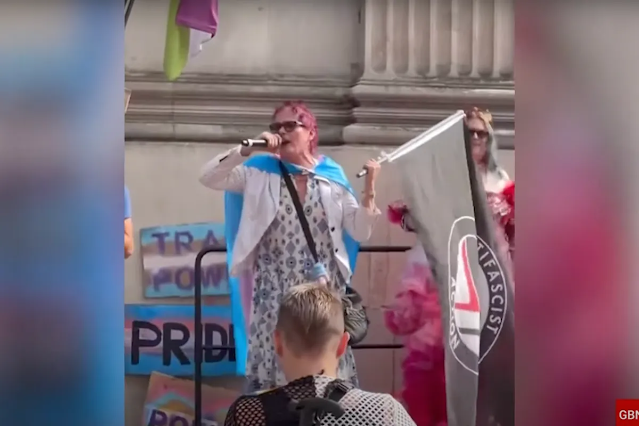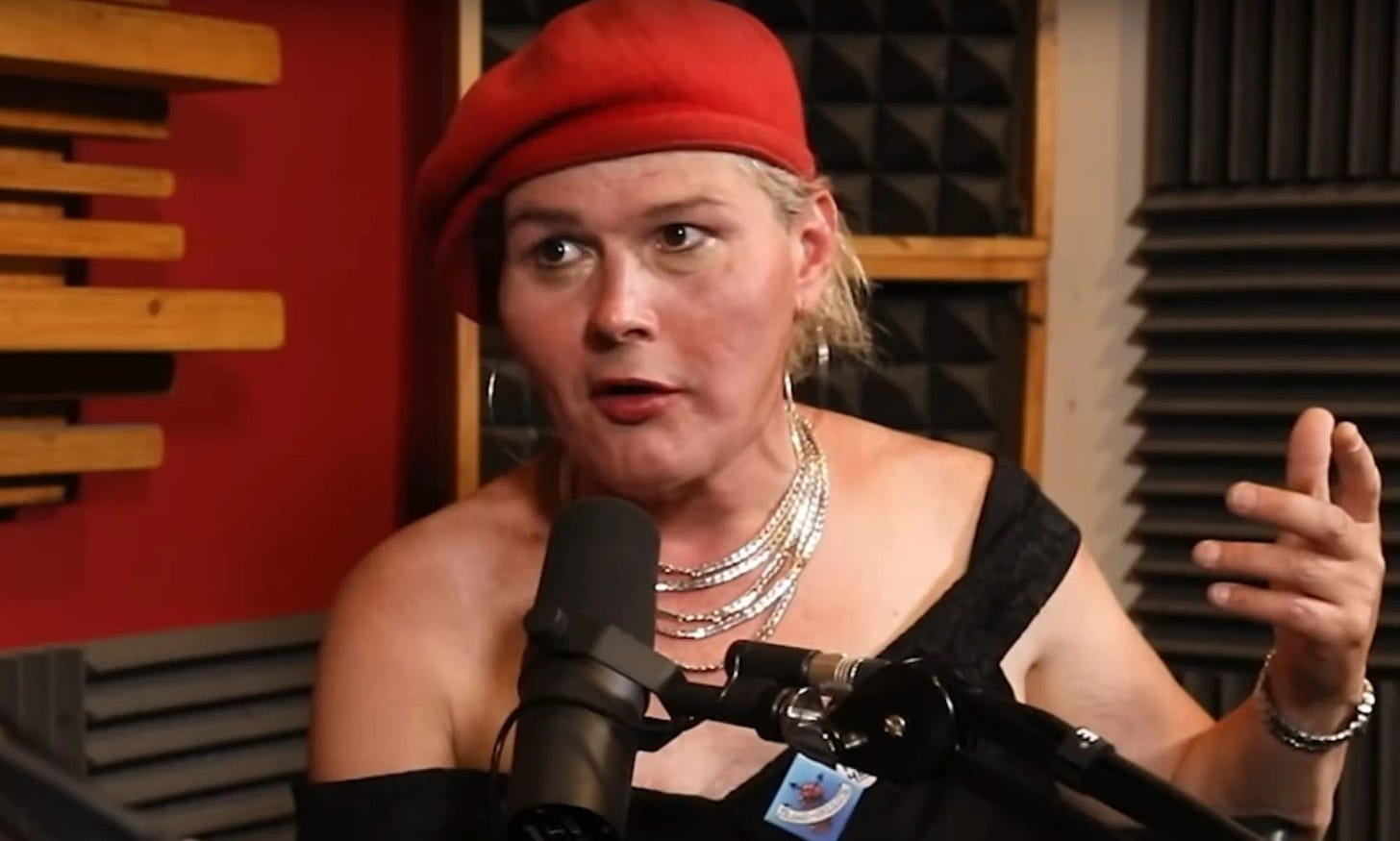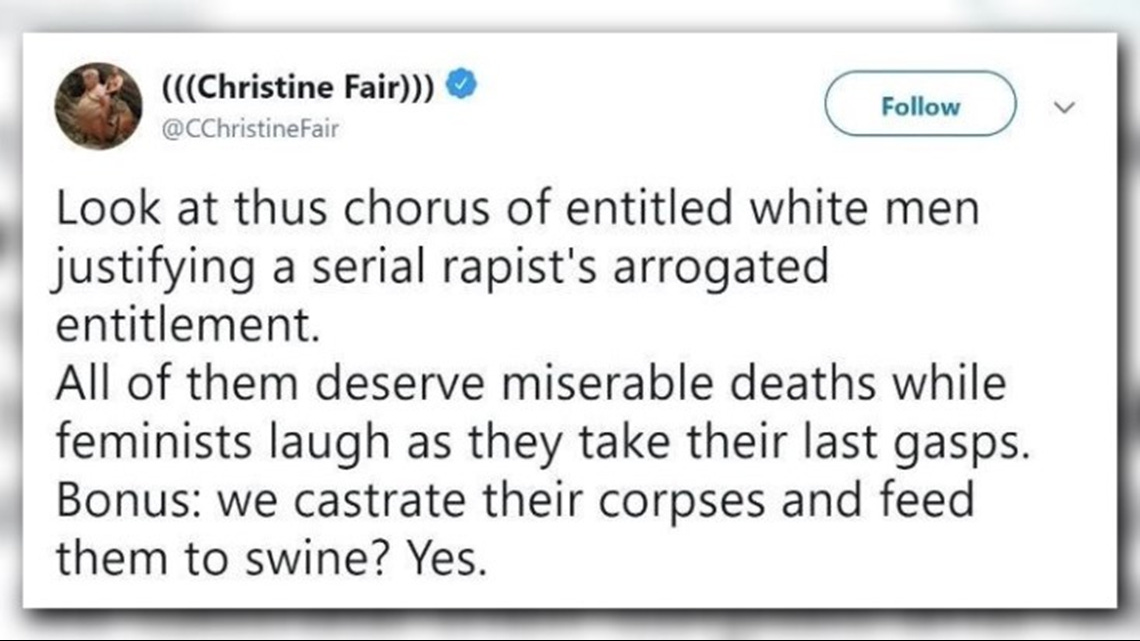Meet the New Feminist Hate, Same as the Old Feminist Hate
Meet the New Feminist Hate, Same as the Old Feminist Hate
Only a blinkered ideologue could frame a standard trans insult as an expression of (you guessed it) "male violence against women"
Seriously, radical feminists: get a new narrative. The old one is as sagging and uninteresting as … well, never mind.
Recently, criminology professor Jo Phoenix conferred with GB News host Andrew Doyle about the escalating war of words between trans activists and anti-trans feminists. Never mentioned in the discussion, not surprisingly, is the link between trans fantasies of righteous violence and feminist fantasies of same.
The occasion was a speech by Sarah Jane Baker at a large London Trans Pride event. Baker is a violent male ex-con who now identifies as a woman. In the speech, widely circulated on social media, Baker told the crowd, “If you see a TERF, punch them in the f**king face.” TERF stands for trans-exclusionary radical feminist, and “punching TERFs” has become a familiar pro-trans meme. Baker’s remark was greeted, as both Phoenix and Doyle noted, with a disconcerting roar of approval, and Baker has now been recalled to a men’s jail, where he deserves to sit for some time reflecting on his idiocy.
But were Baker’s words actually incitement to violence? Incitement in a way, I mean, that the allegedly humorous #KillAllMen is not incitement; or in a way that many high-profile feminist social media posts are not (see, for example, Professor Christine Fair’s tweet about the wished-for deaths of Brett Kavanaugh supporters)? Neither Doyle nor Phoenix hesitated to condemn Baker’s speech as criminal, expressing indignation that police were present at the event and failed to arrest Baker immediately.
According to Phoenix, Baker’s words are part of “the most shocking normalization of violence against women that I’ve seen for a very long time.” Through a not-so-subtle sleight of hand, the verbal attack on TERFs is read as an attack on all women, though there must have been many trans men, gender-queer women, and trans-affirming feminists in the crowd cheering Baker.
For the record, I agree with Phoenix that anti-trans feminists should not have to put up with public calls for violence against them. But it is difficult not to notice Phoenix’s certainty that the only violence worth condemning—in fact, the only violence that exists—is “male violence against women,” an ideological preoccupation that makes her singularly ill-equipped to understand the trans phenomenon and its ironic links to feminist thought.
Frankfurt School guru Herbert Marcuse taught his activist followers (in his infamous 1965 “Repressive Tolerance”) that not all violence is made the same. In particular, the revolutionary violence of the oppressed is a quite different thing from the systemic violence of the oppressors. To condemn the oppressed for their violence is to “serve the cause of actual violence” (even if that violence is indirect and structural). Violence can be justified when it serves a liberatory cause, when it strikes its blows against the upholders (even if they themselves are innocent) of a state-sanctioned violence. This is the position of Antifa and radical trans, as it has been of radical feminism.
For radical feminists, violence against women can never be liberatory and women, possessed of an immaculate innocence born of their perennial suffering, can never be oppressors. Jo Phoenix thus framed Sarah Jane Baker’s statement not as a gesture of resistance against gender tyranny but as an all-too-familiar expression of “male violence.”
Men are used to being blamed en masse whenever a man hurts or even simply offends a woman. It has been thus ever since the first feminists decried male tyranny and found plenty of champions willing to side against their fellow men.
But it’s a bit much to see Phoenix and Doyle agreeing that a man who cut off his own testicles, now dressed in a frumpy flowered dress and lipstick, speaking to other gender-queer activists, many of whom have similarly mutilated themselves to escape gender normativity, is a symbol of male violence. Haven’t we been told for years that male violence is about upholding gender normativity?
Feminists like Susan Brownmiller and Andrea Dworkin were quoted for decades to show that men are violent towards women because they hate women, fear their Otherness, and above all want to control them through terror. They need to hurt and demean women because they feel better about their contemptible masculine selves when they do so. As Simone De Beauvoir phrased it in 1949, “One of the benefits that oppression secures for the oppressor is that the humblest among them feels superior. The most mediocre of males believes himself a demigod next to women” (The Second Sex).
Trans women, on the other hand, reject identification as men and have no wish to flaunt masculine superiority. On the contrary, they see themselves as doubly-oppressed—oppressed as women and as trans—and are outraged that any cis-gender feminist activist would exploit her cis-privilege to deny their self-determined female existence. Such a denial, they argue, is an act of dehumanization that makes possible actual violence against trans women. Responding with insults is fully justified.
For those of us who have studied feminist claims, the above is uncannily familiar. Indeed, trans advocates learned terms such as dehumanization and systemic violence—and above all, privilege—from feminists, just as they learned that gender is a social construct with no self-evident biological underlay (see my earlier essay here). It was feminists who proclaimed that the oppressed had the right to hate the oppressor, to broadcast that hatred far and wide, and even to call for the oppressor’s elimination. Valerie Solanas could write in her SCUM Manifesto (1967) that killing a man was “a righteous and good act,” even “an act of mercy”—and be applauded for it. Even when she actually attempted a triple homicide, almost managing to kill pop artist Andy Warhol, prominent feminists like the head of the New York chapter of NOW were exultant over her righteous rage.
When serial killer Aileen Wuornos, who murdered seven men, was arrested and charged in 1991, feminist thought-leaders could openly empathize with her exculpatory victimhood, gushing about “Everywoman’s most forbidden fantasy,” in Phyllis Chesler’s phrase. And when university professors called for the reduction of the male population to 10% as part of a necessary “decontamination” of the earth; when published authors fantasized about vigilante killings of men and boasted on Twitter about beating bad men, that was all perfectly okay.
It was okay because men hurt women, and women had a right to lust for male deaths. It didn’t matter that many men didn’t hurt women; it didn’t matter that some women hurt men. This was a class war of the oppressed against the oppressor, in which exhilarating hatred and advocacy of violence were not only understandable but necessary.
Feminists never tried to hide their certainty that they had a license to hate and threaten. They reveled in it, boasted about it, scoffed at anyone who demurred, and still do. Therefore, it is a bit rich to have Professor Jo Phoenix expressing horror over a call to punch a TERF, and lecturing us about “techniques of neutralization” by which calls for violence against some targets are made acceptable. We’ve had a master class in that from her feminist consoeurs since at least 1967.
And now here we are, with trans women claiming that as particularly vulnerable women, they have every right to hate their oppressors among the cisterhood. It’s long past time feminists realized that when a movement hates vociferously enough and proclaims that hatred holy, it’s not surprising when those it taught to hate return the favor. Violent rhetoric on all sides should be unconditionally condemned and the game of victim politics at last rejected.
Source: The Fiamengo File




Comments
Post a Comment